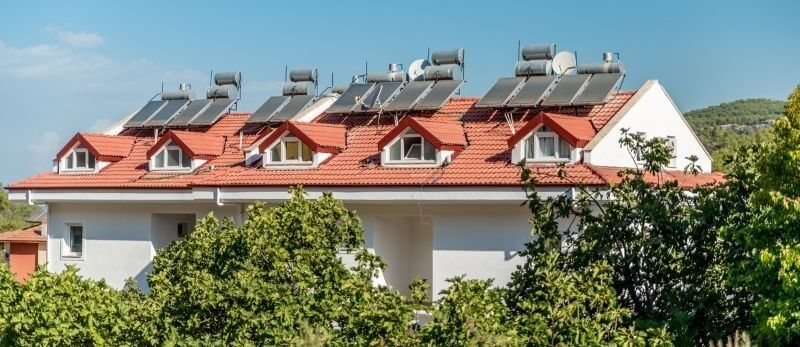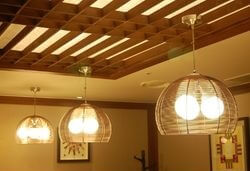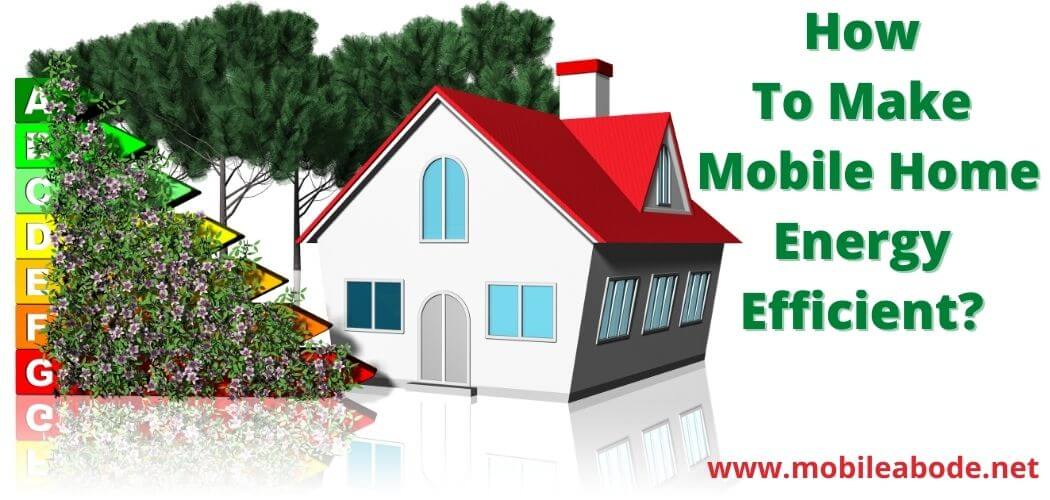A mobile home can be a wonderful option for someone who doesn’t want to commit to living in one place. The problem is that these homes are not built with energy efficiency in mind, which means they end up costing more money on utilities than other types of housing would.
Fortunately, there are several tips and tricks you can use to make your home more efficient.
Tips to Make Mobile Home More Energy Efficient
Here are few tips to make a mobile home more energy-efficient.
1) Heat
In the winter, find ways to keep your home from losing heat. Check for air leaks around doors and windows, especially if they are in a basement or attached garage.
If you have a crawl space under the house, install a plastic sheet with insulation between it and the floor joists. Also, insulate hot water pipes going through walls and ceilings to prevent lost heat there.
If you have a fireplace, use wood only if it’s been aged for one year or more.
In addition, choose another heat source because burning firewood creates creosote that is highly flammable and accumulates on chimney walls over time.
2) Cooling
Don’t let the indoor temperature get above 78 degrees Fahrenheit in the summer. Keep windows and doors closed during the day to keep heat out.
Use insulated drapes, especially over windows that face south. Open windows at night after it cools off outside.
If you have an window air conditioner, make sure its cooling coils are clean of lint and dirt buildup to reduce air resistance. In addition, use a programmable thermostat so you can create a temperature setting for different times of the day.
Be careful not to block any exterior vents on the unit because this makes proper ventilation impossible and could damage your AC unit.
3) Electricity
Install low-flow showerheads to cut down on the energy needed for large amounts of heated water used in taking showers or baths.
Keep refrigerator and freezer doors fully closed as much as possible to keep the cool air inside. Make sure refrigerator and freezer seals are tight because any leaks will cause them to work harder, thus using more energy.
Also be sure that the refrigerator’s fan grill is not covered up by items placed on top of it, which also can reduce its efficiency.
For the washing machine, always use hot water for whites and cold or warm water for colors. Keep mobile home dishwashers as full as possible so they run fewer loads during each cycle.
4) Water heater
For smaller homes, a 30-gallon electric tank is sufficient enough for several people. Larger homes may need larger tanks that heat water faster but cost more in electricity bills to do so.
With gas-powered heaters, higher thermostat settings result in faster recovery times. So, set the temperature at 120 degrees Fahrenheit to save money on your utility bill.
5) Plumbing Lines
To reduce water consumption, place an aerator on all of your faucets and install low-flush toilets.
A new sink can use up to 32 gallons of water per minute while older models may need as much as 50 gallons.
Modern toilets typically use four or five gallons per flush so you can replace older units with newer ones if needed.
However, if you know how to repair a toilet flange, you may be able to fix them instead. Also, pipe insulation is one of the effective ways which reduces heat loss through hot water pipes and saves energy consumed for heating water by reaching the home-heating system.
6) Windows & Doors
Replace older windows with double-paned models to reduce infiltration of cold air in the winter. During summer, make sure window coverings let in enough sunlight but block out heat from the sun’s rays.
Install weatherstripping around all exterior doors to prevent unwanted air leakage into or outside of your home.
Also, check for cracks around windows and doorframes that may be letting warm or cool air escape.
7) Insulation
Cover exposed surfaces with insulation to maintain the temperature inside your mobile home regardless of what’s happening outside.
There are many types of insulation available, but choose one designed for installation on walls, ceilings and floors because it offers better long-term protection than fibreglass batts.
To add insulation to ceiling rafters, cut and fit rigid insulation board over them, then seal the seams with spray foam or caulk.
8) Maintenance
Have heating system maintained regularly by a qualified professional such as an HVAC contractor so it runs at maximum efficiency and preventative repair measures can be taken?
Also, pay attention to other appliances in your home that use heating or cooling elements such as baseboard heaters and stoves because they also will need servicing on an annual basis.
For example, the Rheem water heater is very efficient and causes low maintenance problems.
An average 50-gallon storage tank-style water heater uses between 14-25 kWh per month. This means that a 50 gallon is used about an average of 200-300 kWh per year, and my Rheem has saved me over $3000 in the last 4 years I have had it.
9) Solar heating

For hot water use, consider installing solar panels to heat water for your home or pool. Also, they help you save money on utility costs by generating free electricity for your home.
To further reduce energy consumption and lower high bills, turn off all unnecessary lights in the house when leaving a room and turn down the temperature setting on your thermostat if you’re going to be gone awhile.
This may not seem like much but you’d be surprised at how much it helps every when everyone does their part in a community.
Lastly, solar panels are a great investment and help to offset the cost of purchasing them in the first place with all your savings from switching to renewable energies.
10) Appliances
Turn off appliances at the power strip when not using them because they continue to draw energy even when turned off.
If you’ll be away for an extended time period, unplug these devices because they use electricity even if turned off (known as phantom loads).
As mentioned earlier, today’s appliances like computers and TVs use much less electricity than older models but still contribute to home-heating costs.
When shopping for new appliances that use less energy, look for the Energy Star label; it was created by the EPA in 1992 to identify products that meet strict energy-efficiency guidelines.
11) Lighting

Replace old fixtures with higher-wattage bulbs such as compact fluorescent ones to save money on energy bills and lessen the impact on the environment.
Replace one 60-watt bulb with a 13-watt CFL, and you’ll reduce your electric bill by $30 over its lifetime and prevent 450 pounds of greenhouse gas emissions from entering the atmosphere.
Also, use dimmers or timers to control outdoor lighting because they’re less costly than turning lights off when, not in use and can extend bulb life up to 10 times for those who leave home before daylight hours arrive.
Making these changes will decrease electricity consumption and lower heating costs.
One word that sums it all is that we need to adopt renewable energies for better living and be more conscious about our consumption of energy.
Conclusion
The more energy-efficient the home, the less it costs to maintain. So go ahead and make your mobile home as green as possible!
The first step to making a mobile home more energy efficient is by sealing up leaks. This needs to be done with air-tight materials, so it’s important to know what you are working with!
You can also use insulation for the walls and flooring as well as seal off any vents or doors that lead outside.
In addition, there are many different types of solar panels available on the market today which will help keep your power bill low.
These three things should get you started in improving your mobile home from being an energy hog into something much more environmentally friendly and cheaper long term.
It will not only save you money on utility bills but also on repairs in the long run. Who knows? You might even be able to sell or rent out your property for a higher price because of its environmentally friendly features.

